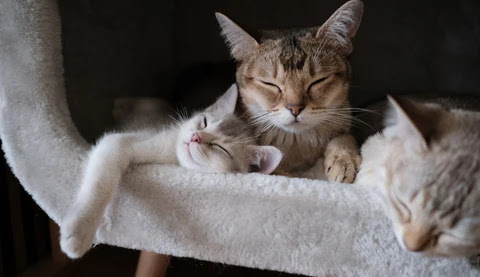why cats age so fast?
Cat Aging Signs
As cat owners, it’s important for us to understand the aging process of our feline companions. Cats age differently compared to humans and even other animals. While they may appear to be youthful and playful in their early years, they can show signs of aging much sooner than we expect. In this article, we will explore why cats age so fast and how we can provide the best care for our aging feline friends.
Cat Aging Process
Cat’s Life Expectancy
The life expectancy of a cat can vary depending on various factors, including breed, genetics, and overall health. On average, cats can live for around 13 to 17 years. However, some cats have been known to live well into their twenties. It’s essential to provide a healthy lifestyle and proper veterinary care to ensure our furry friends live their best possible lives.
Maintaining Cat’s Health in Aging
As our cats age, it becomes crucial for us to prioritize their health and wellbeing.
Here are a few tips to help maintain their health during their golden years:
- Regular Veterinary Visits: Schedule regular check-ups with your veterinarian to catch any potential health issues early on.
- Proper Nutrition: Provide a balanced and age-appropriate diet to meet their nutritional needs. Consult with your vet to determine the best diet for your aging cat.
- Weight Management: Help your cat maintain a healthy weight to alleviate stress on their joints and reduce the risk of obesity-related health problems.
- Exercise and Mental Stimulation: Engage your cat in gentle exercise and provide mental stimulation to keep their body and mind active.
- Dental Care: Pay attention to your cat’s dental health and regularly brush their teeth or provide dental treats specifically designed for cats.
- Comfortable Environment: Create a comfortable and safe living space for your aging cat, ensuring easy access to food, water, and litter boxes.
Tips for Senior Cats
Senior cats require extra care and attention.
Here are some specific tips to help you provide the best possible care:
- Regular Health Monitoring: Keep an eye out for any changes in behavior, eating habits, or bathroom routines. These can be signs of underlying health issues.
- Provide Cozy Sleeping Areas: Provide warm and comfortable sleeping areas for your senior cat, away from drafts or cold floors.
- Joint Support: Consider providing joint supplements or special diets formulated to support joint health in senior cats.
- Play and Bond: Continue to engage with your senior cat through playtime and bonding activities to ensure they feel loved and stimulated.
- Grooming: Help your cat with grooming tasks such as brushing their fur or trimming their nails, as they may face difficulties in doing so themselves.
- Monitor Litter Box: Keep a close eye on your cat’s litter box habits to detect any changes that may indicate urinary or bowel issues.
Aging Cat Care Tips
Cats age faster than humans, and it’s essential for us to provide the appropriate care.
Here are some additional tips to ensure your aging cat remains healthy and happy:
- Love and Attention: Shower your cat with love and attention, providing them with a sense of security and happiness.
- Manage Stress: Minimize stressful situations and provide a calm living environment for your aging cat.
- Senior-Specific Food: Consider transitioning to senior-specific cat food that addresses their changing needs, such as digestive support or lower-calorie options.
- Keep Them Hydrated: Encourage your cat to drink water by providing fresh water sources and considering wet food options.
- Regular Exercise: While not as vigorous as before, gentle exercise helps to maintain muscle tone and joint flexibility.
- Keep Them Warm: Provide heated beds or blankets during colder months to keep your aging cat comfortable.
Cat Health and Aging
As cats age, their bodies become more vulnerable to various health conditions.
Some common age-related health issues in cats include:
- Arthritis: Joint inflammation and pain can develop over time, making it difficult for cats to move comfortably.
- Dental Disease: Cats are prone to dental issues such as gum disease and tooth decay. Regular dental care is crucial.
- Kidney Disease: Reduced kidney function is common in aging cats. Monitoring kidney health through blood tests is essential.
- Hypertension: Older cats may develop high blood pressure, which can lead to organ damage if left untreated.
- Hyperthyroidism: Overactive thyroid glands are common in senior cats and require medical management.
- Heart Disease: Some cats may develop heart conditions, including cardiomyopathy, as they age.
Promote Cat Vitality
While the aging process in cats is inevitable, there are steps we can take to promote their vitality and improve their quality of life:
- Quality Time: Spend quality time with your aging cat, providing them with love, companionship, and mental stimulation.
- Environmental Enrichment: Create an enriching environment with toys, scratching posts, and interactive feeding puzzles to keep your cat engaged.
- Comfortable Resting Places: Ensure your cat has access to cozy and comfortable resting places throughout your home.
- Regular Vet Check-ups: Maintain regular veterinary visits to monitor your cat’s health and address any potential issues.
- Social Interaction: Encourage positive social interactions with other pets or gentle human visitors to prevent isolation and boredom.
- Love and Patience: Offer love, patience, and understanding to your aging cat as they may require extra care and attention.
By understanding the aging process and providing the necessary care, we can ensure our furry friends age gracefully and enjoy their golden years comfortably.
Remember, the bond we share with our cats only grows stronger as they age, and it’s our responsibility to provide them with the best possible care.














